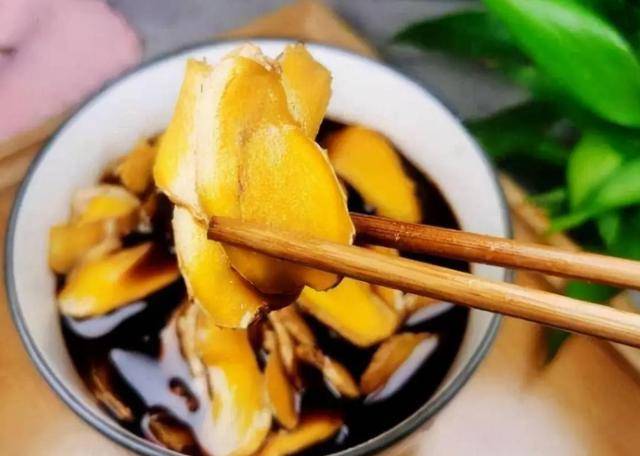Ginger, a Chinese medicinal herb, is the fresh rhizome of the perennial herbaceous plant in the ginger family. It is also known as ginger root and is a common ingredient in households and a seasoning. Ginger not only helps to adjust the taste of dishes but also has various applications.
For example, when feeling nauseous in a moving vehicle, placing a slice of ginger on the wrist or under the nose can effectively alleviate motion sickness. Additionally, cutting ginger into small pieces and soaking them in water with brown sugar can help dispel dampness and keep warm.
Ginger mainly contains volatile oils, gingerol, resin, starch, proteins, fats, carbohydrates, trace elements, and various vitamins. It provides the body with multiple nutrients, making it very beneficial for health when consumed in moderation.
There are many ways to use ginger, besides enhancing the flavor of dishes, it can also be consumed raw. In the past, people used to soak ginger in vinegar to make pickled ginger. The taste of vinegar, with its slight sweetness, can offset the pungency of ginger, enhancing the overall taste.
Pickled ginger not only improves the taste but also has health benefits. Some believe that pickled ginger can even treat certain ailments. While pickled ginger has some medicinal value, it is not a cure for all diseases. For mild symptoms, consuming pickled ginger in moderation can provide relief, but for severe illnesses, seeking medical attention is necessary.
What happens to people who consume pickled ginger in the long term?
Improves Digestion
Ginger is believed to stimulate digestion by increasing gastric acid secretion, aiding in food digestion. Vinegar is thought to increase the acidity of gastric juice, further facilitating digestion. Many believe that long-term consumption of pickled ginger can alleviate digestive issues such as stomach pain and indigestion. However, this view lacks extensive clinical research to confirm its effects, requiring further scientific validation.
Boosts Immune System
Ginger is considered to have anti-inflammatory and antioxidant effects, aiding the body in disease resistance. Vinegar is believed to regulate the immune system and enhance immunity. Long-term consumption of pickled ginger is thought to prevent colds and other illnesses. Nevertheless, this view lacks sufficient research evidence, thus requiring more scientific studies to support its effects.
Enhances Blood Circulation
Ginger is believed to dilate blood vessels, increasing blood flow and promoting circulation. Vinegar is believed to dissolve fats on blood vessel walls, improving blood flow. Long-term consumption of pickled ginger is thought to prevent cardiovascular and cerebrovascular diseases and improve blood circulation. However, further scientific research is needed to validate this view.
Weight Loss
Ginger is thought to boost metabolism and promote fat burning, while vinegar is believed to inhibit fat synthesis and increase fat metabolism. As such, some people use long-term consumption of pickled ginger as a supplementary weight loss method. However, this perspective also requires more scientific research for validation.
Considerations When Eating Pickled Ginger
Choose Quality Ginger and Vinegar: Select fresh ginger with tender skin and bright color, and intact texture. Use high-quality rice vinegar or pure vinegar without additives or preservatives for richer nutritional content.
Consume in Moderation: Use 2 to 3 slices of ginger per soaking, add an appropriate amount of rice vinegar or pure vinegar, then add water in moderation. Adjust the ratio of ginger slices and vinegar according to individual preferences. Consume once a day, with 10 to 20 milliliters per serving, avoiding excessive intake.
Observe Symptoms: If stomach discomfort, nausea, vomiting, or other symptoms occur after consuming pickled ginger, discontinue use immediately and seek medical attention. Individuals with digestive system disorders, allergies, pregnant or breastfeeding women, and special populations should use pickled ginger with caution, preferably under medical guidance.
Use with Caution: When soaking ginger, try to avoid consuming it together with foods rich in vitamin C to prevent affecting the absorption and efficacy of ginger’s active ingredients.
Storage Guidelines: Sealed pickled ginger slices can be stored in a glass jar in a cool, dry place, away from sunlight. Regularly replace ginger slices and vinegar to ensure taste and quality.
Healthy Diet: Pickled ginger is not a panacea, but rather a method for assisting in body regulation. Alongside pickling ginger, pay attention to a healthy diet, consume balanced nutrition, avoid overeating, excessive oily and spicy foods, engage in moderate exercise, and maintain a pleasant mood.
Since individuals have different physical constitutions, their reactions to pickled ginger may vary. Therefore, adjust based on personal circumstances during pickled ginger use, discontinue if discomfort arises, and seek advice from a physician.


